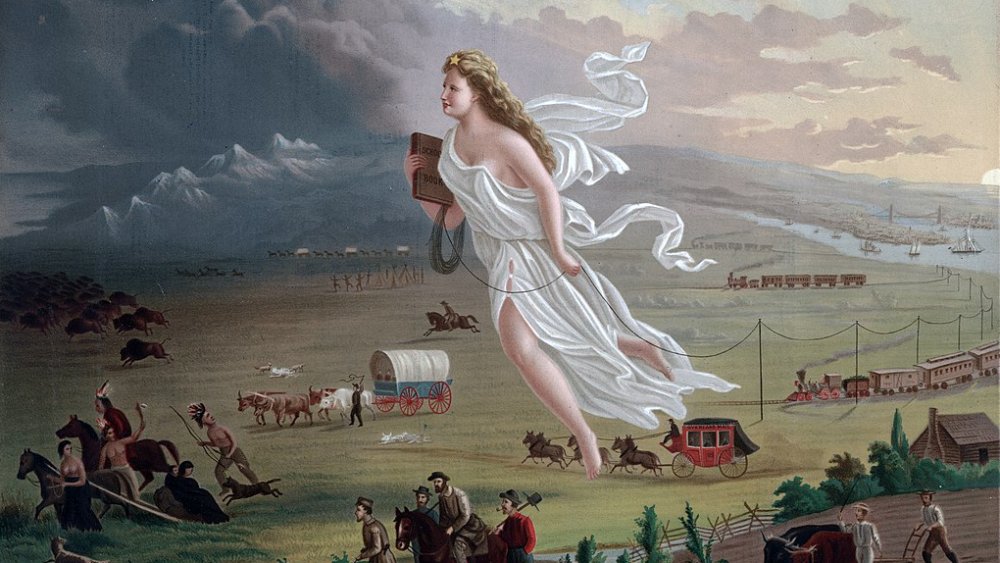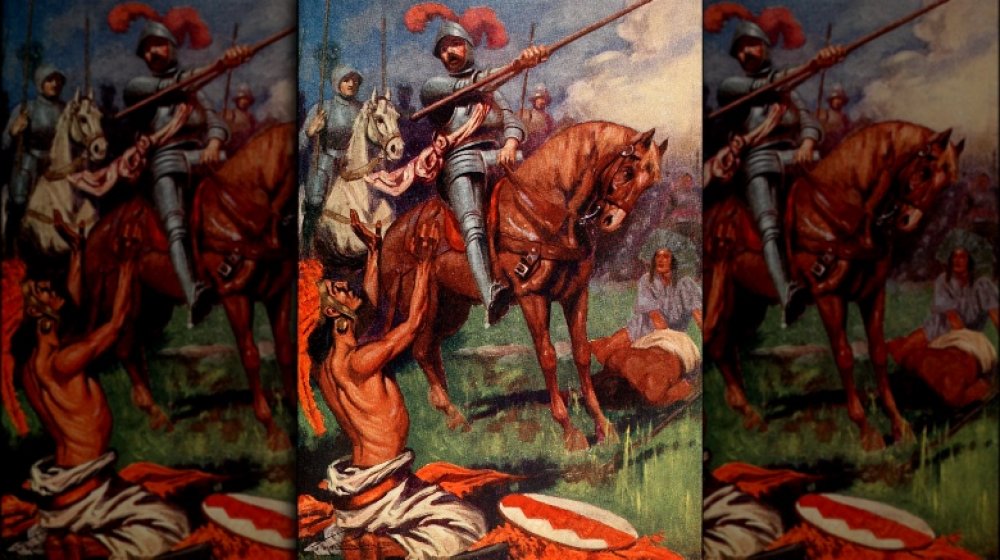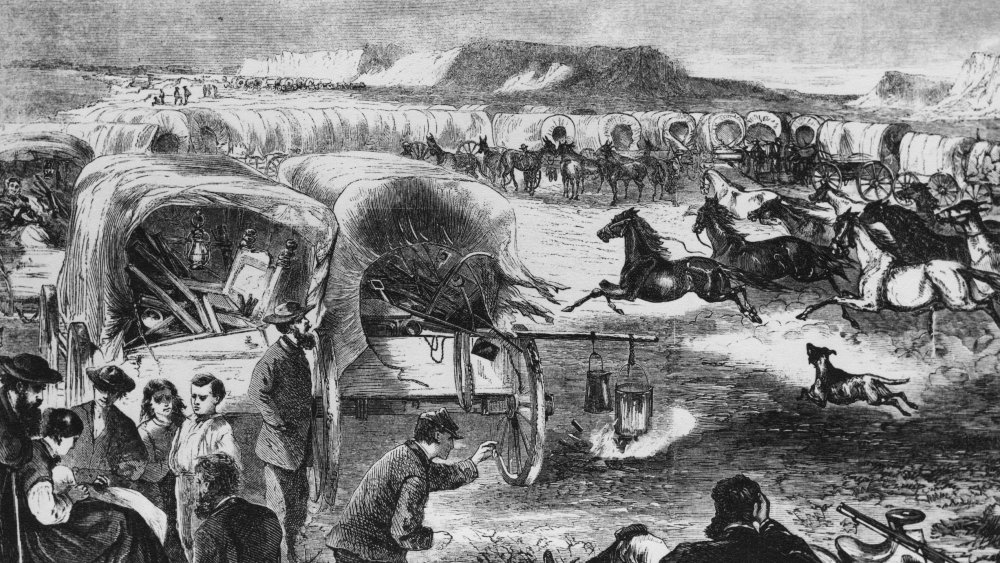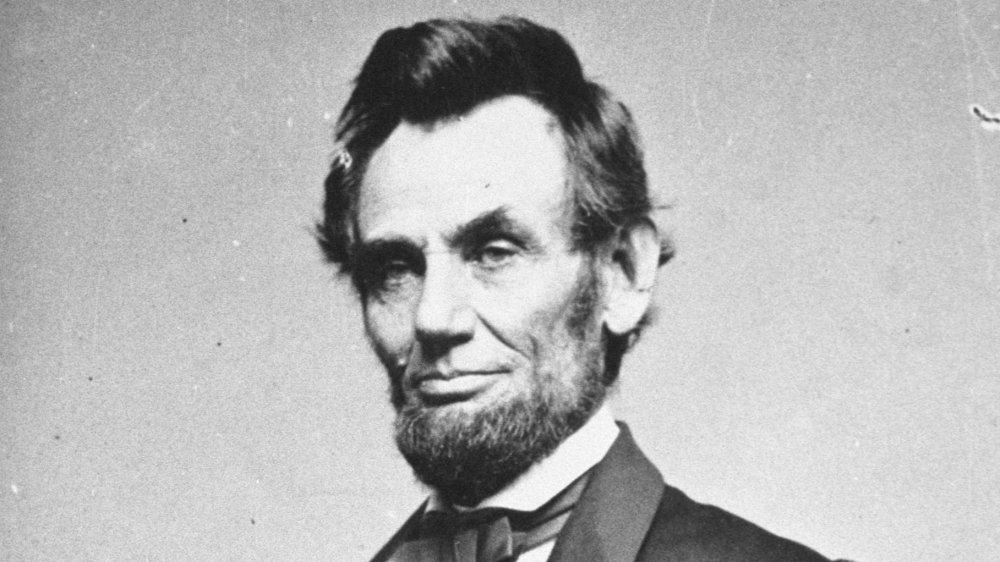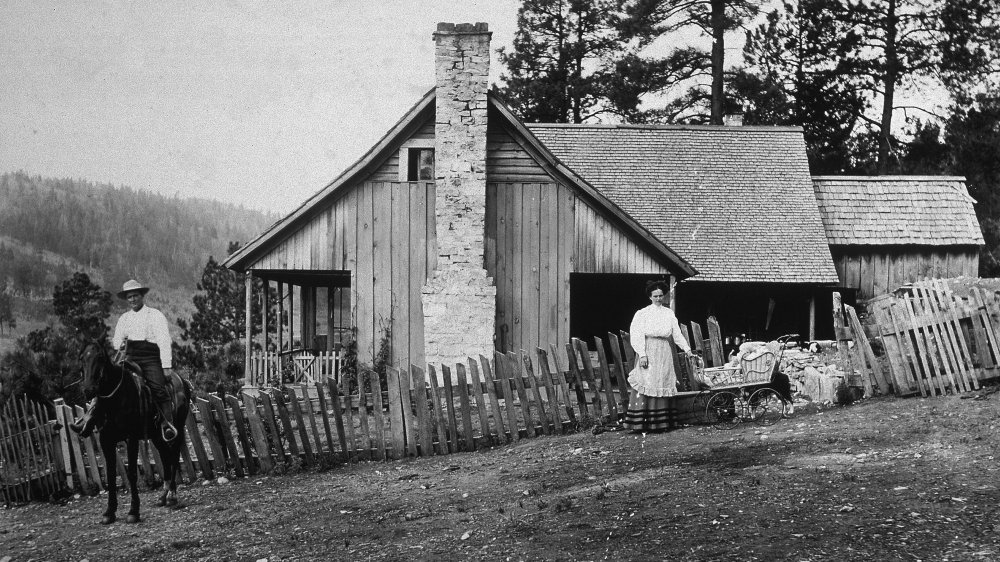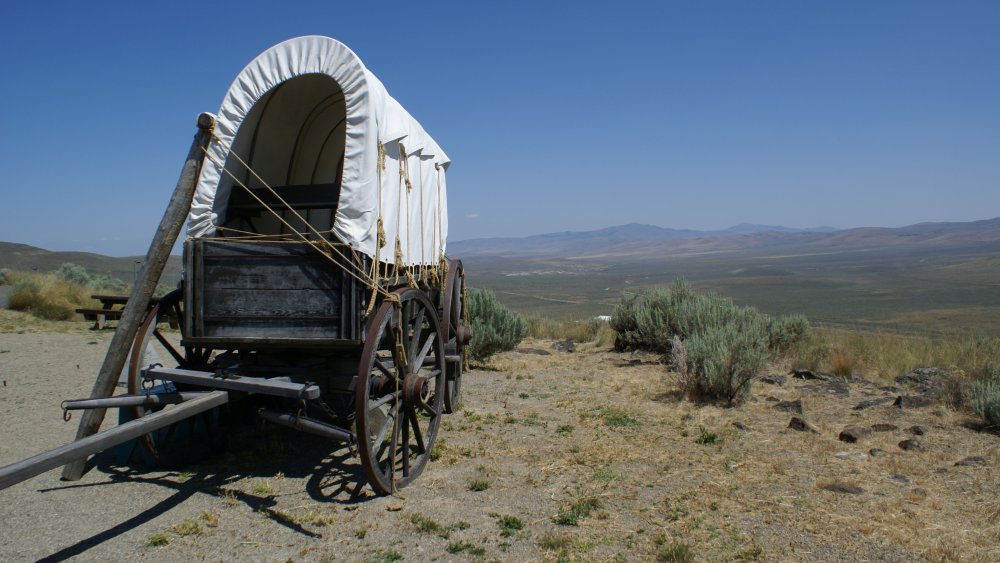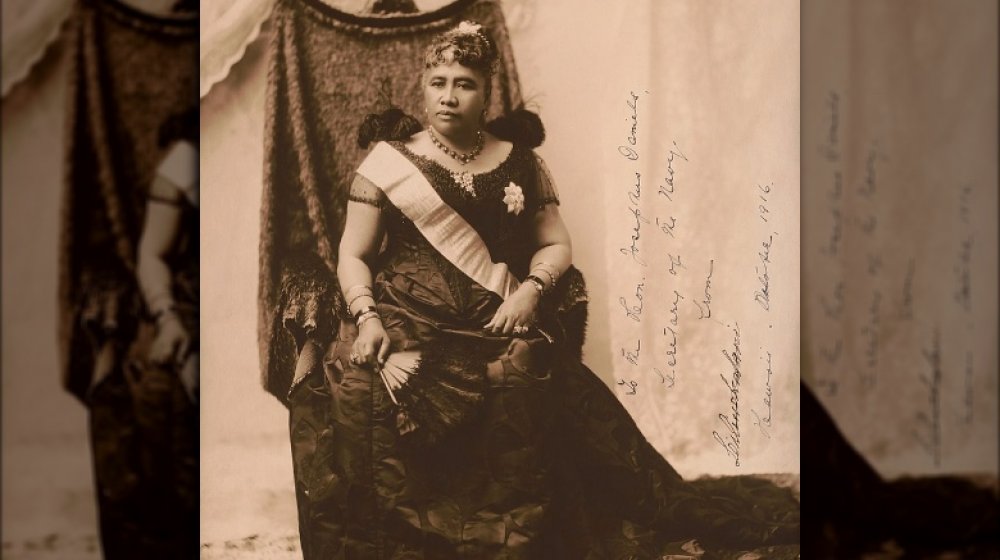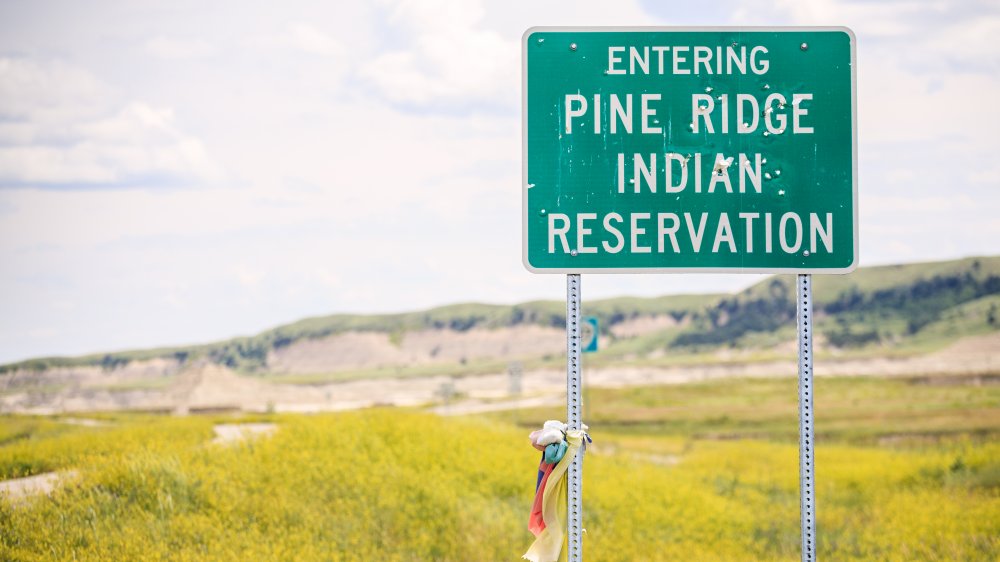The Messed Up Truth Of Manifest Destiny
If racism had a slogan, it would be "manifest destiny." Actually racism has about a million different slogans, like "all lives matter" and "one of my best friends is Chinese," so really you could take your pick. But manifest destiny is one of history's worst racist slogans.
If you slept through high school history (and really, who didn't?) you may only be dimly aware of what manifest destiny actually is, so let's start with a definition. Back in the days of American colonialism, settlers had to come up with some way to justify the part where they were walking onto someone else's land and announcing, "Welp, this is mine now." Not that there were many people in those days who even felt like that kind of stuff needed justification, but hey if it's ordained by God then that one half a cell somewhere between your nose and the top of your skull that's feeling a little bit bad about all the people who got displaced, murdered, or somewhere in between can just relax now because it's all a-okay.
So to sum up, manifest destiny was basically God giving white people permission to commit genocide. Here's how it all unfolded.
Surprise, the idea of manifest destiny wasn't made up by Americans
Americans don't have a monopoly on racist stupidity, and as far as the invention of manifest destiny is concerned, well, that wasn't all America. Those ideas have been around for a long time. In fact, who's to say that homo sapiens weren't all, "God hath ordained we take those caves away from those Neanderthal guys." Written history doesn't go back that far, but the British were manifest-destinying all over the world long before America was doing it, and so was most of Europe, so it's not like Americans woke up one day and said to themselves, "We should own North America." That was pretty much a given when the first settlers decided to move in to the Indigenous peoples' backyard.
It was articulated, too, so clearly there were some people with guilt-ridden half brain cells who felt like their actions might require some philosophical justification. According to historian Michael T. Lubragge, Andrew Jackson, major American creep and face of the $20 bill, led a brutal attack against rebellious Seminole Indians in Florida in 1818, and Americans generally made themselves feel okay about it by reassuring each other that Florida was an American territory, so America was entitled to do whatever it took to hang onto those lands. Because destiny.
Manifest destiny: A racist slogan is born
The first guy to use the phrase "manifest destiny" wasn't trying to coin a racist slogan, though he had fairly racist reasons for using the freshly coined phrase. According to Britannica, John L. O'Sullivan was the editor of a political magazine, and at first he seems to have just been trying to throw together a word salad in an 1845 article about why America ought to annex Texas. He wasn't even using the phrase to argue directly for American occupation of native lands, either. He was mostly just complaining that England and France wouldn't keep their noses in their own business. Those two nations, O'Sullivan moaned, were "thwarting our policy and hampering our power, limiting our greatness and checking the fulfillment of our manifest destiny to overspread the continent allotted by Providence for the free development of our yearly multiplying millions."
And then people read those words and went, "Yeah, manifest destiny, woo woo!" And O'Sullivan went, "Hmm, maybe I'm onto something." So he wrote another article in which he spoke about the idea a bit more directly, decrying his belief in "the right of our manifest destiny to overspread and to possess the whole of the continent which Providence has given us for the development of the great experiment of liberty and federated self-government entrusted to us." Except for slaves and Indigenous people, of course. No experimental liberty for you.
Stupid ideas are almost never simple
In order to make yourself feel okay about all of that manifest destiny, you had to build a fake moral framework up around it. And that's what Americans did, and their ideas were pretty rich.
First of all, they declared that America was virtuous, its people were extra-super virtuous, and its laws and institutions were especially virtuous, and therefore it was America's obligation to remake the rest of the world in its own image, starting with the people who were here first. According to the Blackhawk Museum, Americans wanted to redeem the sins of the Old World — you know, the tyranny of kings, the brutal wars, the invention of Marmite — by building a better world in the New World. They did it by massacring Indigenous people, but no matter, the sins of the Old World weren't against Indigenous people so that was all irrelevant.
But the major driving force behind manifest destiny was the destiny part, the belief that no one could change the trajectory of white occupation of the New World because it was destiny. It was a duty assigned to America by God. Therefore if you weren't doing your part to take over the lands of the New World and subjugate the Indigenous population, well, that was an affront to God. Does that guilt-stricken half a brain cell feel better now? Also, here's some free land.
Because religion is all about God's love and trouncing all over the Indigenous people
If you try hard enough, you can find a way to justify pretty much all of the worst things you do. Ate a dozen donuts in one sitting? Everyone deserves a treat sometimes. Cheated on an important exam in medical school? Failure would have meant depriving the world of an otherwise brilliant physician. Murdered a few Indigenous Americans? It's okay, God approves!
Manifest destiny gave European settlers license to treat Indigenous Americans (and also slaves) like subhumans. According to the National Humanities Center, manifest destiny — even before there was a name for it — had its roots in religion. Europeans felt like they'd "discovered" the New World because God had ordained it, and therefore it was their God-given duty to bring Christianity to the heathen Americas. Oh and also the heathens, being heathens, were beneath Europeans, and therefore Europeans could take all their stuff.
Some people do seem to have earnestly believed that they were doing the right thing. Missionaries genuinely thought they were saving the souls of the heathen tribes, and that appears to have been their primary motivation for going west. But they were only a few people, and even if their hearts were in the right place their actions were still pretty obnoxious, so any way you look at it religion was a lousy excuse for genocide and subjugation.
America wasn't necessarily united on the subject
It's sometimes tempting to believe that human beings are just nasty by nature, and it's really been only in the past couple of decades that there's been a shift towards compassion and the true equality of all people. But even in the early days of America there were actually some people who were like, "Hmm, maybe manifest destiny is a crappy thing to do." Some of those people were actually outspoken about it, too, though they were more or less drowned out by the majority.
According to the Blackhawk Museum, a few prominent Americans like Abraham Lincoln and Ulysses Grant opposed the idea of manifest destiny. So did the Whigs, who you may remember as the political party who made the two party system in America a thing. So it was cool that they were opposed to systemic racism and everything, but thanks a lot for the rest of the crap you saddled us with, Whigs.
Anyway, Lincoln was opposed to the Mexican-American War largely because he thought it was an excuse for the United States to start oozing into other territories (he was right), but he was one of only a few who thought that was a bad thing. For the most part, then-President James K. Polk's policies enjoyed a lot of support and went mostly unopposed. At least Lincoln got people to listen to him about slavery, though. Eventually.
Manifest destiny was basically a doctrine of white supremacy
Wrap it up in religion all you want, say you're saving the souls of the natives, there's still no denying what the fundamental roots of manifest destiny actually were. It was all about white people taking everyone else's stuff and not being held accountable for it.
According to the National Humanities Center, during the heyday of manifest destiny there were clear racial lines drawn between the haves, the have-nots, and the shouldn't-haves. Native Americans could not claim permanent possession of any land on the North American continent, even though it literally belonged to them. Other non-whites couldn't claim possession of land, either. And if natives and other non-whites couldn't claim land, then the only people who could claim it were white Americans. It was white supremacy in its pure, unadulterated form — a belief that non-whites couldn't be trusted with land ownership (or just didn't deserve it), and therefore only whites could become stewards of the land as God intended. And then whites took the land and over-hunted all the game and cut down all the trees and polluted rivers and made a mess out of everything, just as God intended. Hmm, maybe Americans might have misinterpreted the will of God? Oh well, too late now.
Manifest destiny was coded into law with the Indian Removal Act of 1830
During his presidency, James K. Polk did some serious manifest-destinying, but Andrew Jackson was the poster child. He was the man behind the "Indian Removal Act," which was so racist no one even bothered to come up with a not-racist name for it. "What good man would prefer a country covered with forests and ranged by a few thousand savages to our extensive Republic, studded with cities, towns, and prosperous farms embellished with all the improvements which art can devise or industry execute, occupied by more than 12,000,000 happy people, and filled with all the blessings of liberty, civilization, and religion?" Jackson asked during a speech in 1830. Hey Jackson, you forgot traffic, smog, and rude people. Civilization is awesome!
Anyway, according to the Library of Congress, the Indian Removal Act — enacted 15 years before the term "manifest destiny" was even a thing — basically just made it legal for Jackson to seize Indigenous lands that were within state borders and force their occupants to move west into unsettled territories which they'd never seen and were going to have to leave in a few years anyway as land-hungry Americans decided to go west in search of even better lands to steal, err, annex. The most famous resettlement that happened under the auspices of the Indian Removal Act was the Cherokee "Trail of Tears," which was a forcible march to new lands that cost around 4,000 Cherokee lives.
Sioux who?
More than 1,700 Americans were killed in action during the Mexican-American War, says ThoughtCo, and that's nothing compared to the estimated 25,000 Mexicans who were killed or wounded. To be fair, 13,271 Americans died from disease during that conflict, so no matter how you look at it, it was a sucky conflict with sucky consequences. It wasn't just the deaths, though. When America annexed Texas in 1845, it became clear that not only was there a lot of land in North America, but the United States could successfully take it away from other claimants, thus opening it up for settlement by American citizens.
Meanwhile, people were on wagon trains to Oregon, where they'd been promised land that could be cultivated year-round. At first, the Indigenous people who lived along the Oregon Trail were tolerant of the invaders, even seeing the wagons as an opportunity for trade. Occasionally, the natives killed pioneers but not as often as the pioneers killed natives. Mostly, it never occurred to any of the settlers that they were moving into territories that already belonged to someone else, or maybe they just didn't think the natives would mind. So it was kind of like, "Blah, blah, blah, I can't see all of those Indigenous dwellings and anyway they're not made out of lumber and brick so they totally don't count." It must be nice to be so easily deluded. The Sioux should have just moved into the White House and went, "Oh, we didn't think you'd care."
Manifest destiny was also really bad for Black Americans
It's pretty hard to argue against slavery when you're in favor of genocide, so really manifest destiny went hand-in-hand with slavery. Not only was it racism and genocide that was coded into law, but the westward expansion that was being done in the name of manifest destiny made people wonder if they wouldn't need to bring slaves with them to wash the camp dishes and make the beds and feed the horses — you know, because all that stuff was just too hard to do when you've been sitting in a wagon all day.
Besides leading to the annexation of a bunch of Indigenous lands, the Mexican-American War also helped promote the idea of the expansion of slavery. According to Lumen Learning, the northern and southern states disagreed about whether or not slaves should accompany settlers into the new territories. The South viewed the disagreement as an attack by "radical" abolitionists, and the North viewed it as a power grab by the South, who were desperate to hang onto their rights as slaveholders. The tensions created during this ideological disagreement was a major contributing factor to the American Civil War.
And also Hawaii
After settlers were done with the continental United States, they decided it'd be cool to start annexing stuff that was out in the ocean, too, because hey, annexers gotta annex, right? In 1893 America went after Lili'uokalani, the queen of Hawaii. Well, it wasn't explicitly the U.S. — according to the African American Policy Forum, it was "forces associated with the U.S. government."
A few years before that, American settlers forced the Hawaiian king to sign a constitution that gave voting rights to wealthy (white) non-citizens, while disallowing Asian voters and decreeing that native Hawaiians could only vote if they were literate landowners. But when Lili'uokalani took over she was all, "Hmm, this constitution is racist crap," so she proposed a new constitution that restored the monarchy's power and gave voting rights back to native Hawaiians. Well, the wealthy white settlers couldn't have that, so they formed a militia with 162 U.S. Marines and Navy sailors and forced the queen to capitulate.
The white settlers formed a provisional government and for a while it was chaos — Hawaiian royalists tried to take back the government, the former queen was accused of treason, and the U.S. decided to just annex the place already and be done with it. Most of Hawaii's natives were opposed to annexation because a couple of centuries of history told them everything they need to know about being Indigenous under white rule, but no one asked them, and their wishes didn't factor into the decision. Surprise.
Native Americans today still suffer the after-effects of manifest destiny
Today, everyone is very aware of how epically crappy the whole manifest destiny thing was. Almost everyone. Fortunately, though, America is done capturing territory and expanding its borders. The U.S. doesn't go around annexing stuff anymore, unless you count civil forfeiture or when you annex the last piece of pizza at an office party. But many of the people who were displaced by the policy are still suffering. According to the African American Policy Forum, hundreds of thousands of Indigenous Americans were forced onto reservations, which were traditionally built on the crappiest lands because of the whole "white people get all the best stuff" thing.
On the reservations, Native-American communities were isolated, stripped of their traditions, and denied their rights. In most cases they couldn't hunt or gather food the way they once had, so they were forced to adopt the European system of employment. But their isolation kept unemployment numbers high and income levels low. As a result, alcoholism in Native-American communities is disproportionately high, and so is morbidity, mortality, and disease. These conditions persist today because it's the end result of a long tradition of broken treaties, lies, and genocide, all perpetuated by the concept of manifest destiny.
Manifest destiny lives on
America doesn't annex territories anymore or give people strings of worthless beads in exchange for their ancestral homelands or start wars in order to claim territories, but that doesn't mean manifest destiny isn't still a thing. In fact manifest destiny is still very much alive — today it's a political ideal. It's not called "manifest destiny" anymore, but there are still plenty of Americans who believe that American-style capitalism and American-style democracy are a one-size-fits-all solution to all of the world's problems.
The U.S. has been trying to spread that ideal to other parts of the world for hundreds of years, and although our methods are less morally problematic than they once were, the idea of manifest destiny prevails. It's not to spread ourselves all over the world, though, it's to spread our ideals all over the world. According to ThoughtCo, there's no better example of modern manifest destiny than the 2003 war in Iraq, when the U.S. overthrew Iraqi dictator Saddam Hussein in the hope he could be replaced by an American-style democracy. Look how well that worked out.
